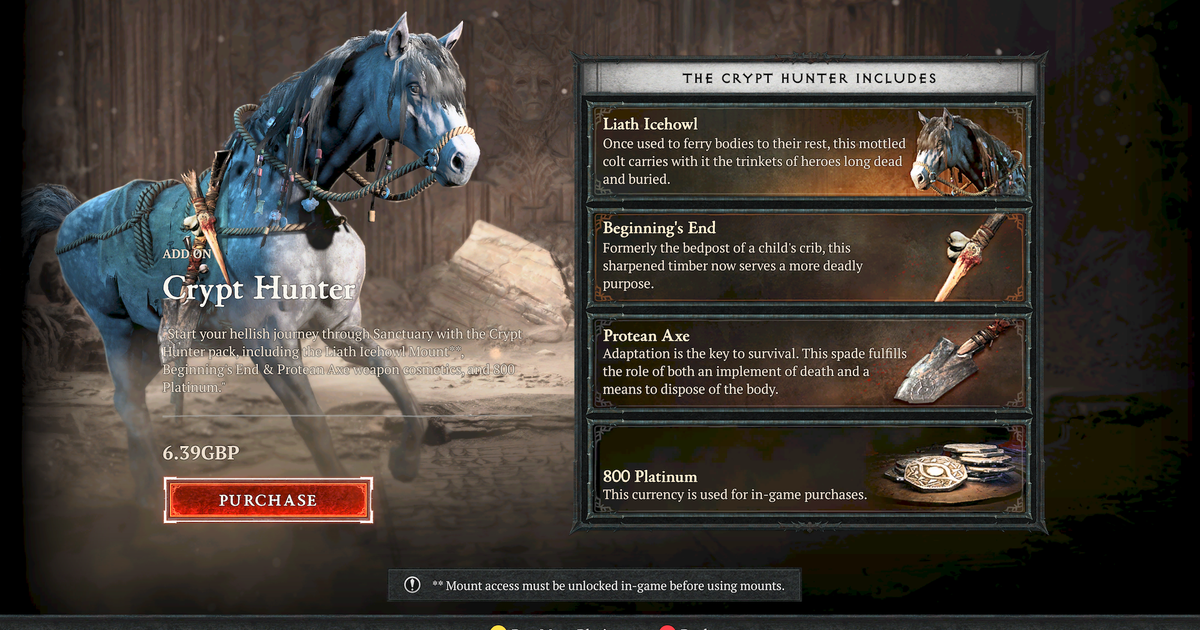As long as cosmetics can also drop as part of playing the game, I don’t care if the shop’s charging people $25 for a gear set, because I don’t need to buy it.
Wouldn’t an ethical issue also be how viable getting the item in-game actually is? Like if it takes around 4000 hours but you can buy it for a buck that might as well be inaccessible in-game
Personally, I am okay with there being cosmetic content that is entirely unattainable without a cash purchase, so long as there is still cosmetic content attainable without microtransactions and the purchased content doesn’t yield any other advantage.
I can accept that I can’t have everything without buying it, far more than I could accept the standard price of a video game going up to $100-$120.
LOZ TOTK is only £50ish though, and that’s a fully fledged 60 ish hour game with tons of content, how can we accept the argument ‘it’s too expensive to make games’?
Two massive differences between TOTK and Diablo 4 though - TOTK is not intended as a live service game with (presumably) years of intense support and extended development post launch, and TOTK is a first party game developed by the most successful video game console company to ever exist - meaning it’s an investment into selling more of their consoles. But mainly the first one. Diablo 4 is going to have seasons of content and according to one developer, 2 DLCs and prolonged support. So it’ll probably end up costing an order of magnitude more than TOTK to produce/support.
I feel these ‘seasons of content’ have limited value, it’s much better to produce something fully functional in the first place. We’ve all gotten used to paying more for less. Of course we can say ‘constant purchases is more profitable for studios’ but does that mean we should accept it? I’ve never been impressed by live service games.
My engagement with them varies from game to game, honestly. For me, the decision to spend extra money on a game I’ve purchased boils down to whether I enjoy the game enough to make it feel worth the money to me. I’ll ask myself if I will feel like I’ve gotten $20’s worth of fun out of it - which might be a crappy question to have to ask myself given that we used to buy games once and be done paying, but that’s where we’re at with the industry.
As it sits with Diablo 4 specifically, though, a cosmetic-only cash shop is something I can peacefully coexist with. I’d rather there be no microtransactions, because I’m not an Activision shareholder, but if there’s going to be some, let them be for optional content only. Besides which, the non-paid gear looks cool as hell to begin with.
To me, whenever I have to put in more cash after the initial purchase I pretty much feel exploited. Not saying I never buy DLC but often what you get in DLC is nowhere near comparable to the hard work put in by mod developers who aren’t getting paid at all (eg HOI IV). I think things will just keep getting worse unless governments put a stop to it.
You’re probably right there. Unfortunately, at least in the US, our government is still largely controlled by people who were born before the cordless phone was invented, or damn near it. They’re still learning how to send an email with an attachment, so it’ll be a while before they’re made to care about microtransactions.
I don’t have a problem with cash shops as most gamers do, but I do find the author’s defense of the price point to be kind of problematic.
IMO, the only reason you should want to buy cosmetics is that you like how it looks, not because most people won’t have it due to its high price. It’s a kind of mindset that is frustrating to see incentivized since it’s less about having something you like and more about having something others don’t (or can’t, at worst).
A counterpoint to most business models like this is Deep Rock Galactic, which doesn’t value scarcity at all and has no time-limited cosmetics, or even cosmetics that cost more $15 USD (and these are all bundles that get you several sets). Despite the lack of exclusivity I still see a lot of people with different appearances because People Just Want to Look Cool.
I know we’re probably pretty far away from Blizzard (or any other AAA dev for that matter) ever adopting a philosophy like that, but I can dream.
For me the sweet spot would be itemizing those $25 cosmetic sets so you can buy pieces of them at a time for a couple of bucks, even if piecemeal it’s a couple bucks more in total. I’m not likely to buy a $25 set but I’ll buy those 6 items at $5 a piece every time.
Of course paid cosmetics aren’t anywhere near as bad as pay to win but it still contributes to a toxic gaming landscape where the developers will nickel and dime you for every little thing rather than just try to create a compelling product you will want to buy once. Ultimately capitalism is toxic to creativity.
I’d suggest the developers themselves are probably not the ones pushing for the inclusion of microtransactions of any kind. Also, cosmetic shops are likely here to stay unless there’s some other way to support long-term development on games like Warzone, Fortnite, and Diablo.
Well by ‘developers’ I mean studios and publishers not individual employees. My question is why can some games seem to get by just fine and continue development without microtransactions? For example Project Zomboid has been in development for like ten years and has never asked for anything more than the sticker price, they just focus on selling more copies.
No Man’s Sky is another example, as well, and I think the answer to those examples lies in the greed of the studios. I don’t like the idea of microtransactions any more than anyone else who isn’t named Bobby Kotick, but given what we know about corporate greed, it’s a reasonable conclusion to draw that if they can’t make billions with a cash shop they’ll make it some other way, and that way would probably be higher sticker prices. Third and fourth yachts don’t pay for themselves, you know.
A counter-point to this I would make is that the prescence of microtransactions can be a pretty hostile design choice with regards to folk who may be more vulnerable to it. Think people who have problems with impulse control, kids who don’t know any better and buying a ton on their parents credit card or someone with a gambling addiction. One could argue that they could do certain things to mitigate the risks, like using parental controls for kids, to prevent them making purchases without their parents permission. But why should this be a thing they have to be dealing with in a game they’ve already paid $70 bucks for? It can be quite exclusionary if someone feels they can’t trust themselves with not splurging too much and have to avoid these games like the plague, even if they would otherwise really appeal to them.
And it also feels like when people talk about the option of buying a cosmetic with real life money, that its a decision thats made in a sort of vacuum between the player purchasing the item and the game. But when you add a multiplayer game into the mix, you introduce a social pressure that can be quite a powerful motivator to pushing someone to make that purchase. An example off the top of my head would be with Fortnite, where theres been times when kids who have all the cool skins and emotes rag on those who are still playing with the default stuff you start out with, which could pressure people to make a purchase they otherwise wouldn’t have.
Combine that with a lot of other little tricks that these storefronts use like making you only able to purchase in-game currency in a set number of quantities, that will more often leave you with a tiny bit left over to prod you to wanna purchase more so you don’t waste the leftover currency. Or using “FOMO” with limited times to buy certain items and I’m just kinda left with microtransactions feeling pretty gross and manipulative to me.
Anyway me ranting on my soapbox over haha, but for a little extra food for thought on the topic, I’d highly recommend watching Folding Idea’s video on the subject as it relates to Fortnite which has been pretty formative for me on the topic





